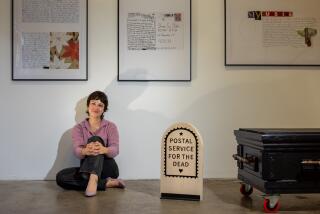Letters home during World War II: A few gems of sorts, and one hilariously flawed pearl
- Share via
Although I had never read the shoe box full of letters I wrote home in World War II, several readers urged me to do so, whatever the cost in embarrassment and emotional havoc.
Richard C. Kennard, a forward artillery observer with the 1st Marine Division at Peleliu and Okinawa, has sent me a copy of his recently published book, “Combat Letters Home” (Dorrance).
Kennard’s letters to his mother and father are full of filial love, informative, slightly tinged with the scent and fear of battle, and glowing with an innocent patriotism and self-awareness.
One begins, “It is now a few days before D-Day and our convoy is sailing quietly along down ‘combat lane.’ This will be my last letter until we get the islands secure and I have my writing paper again. . . . “
Of course that was the sort of letter we all wrote before going into combat: taciturn, brave, naively optimistic and slightly gung-ho. It was a letter calculated to throw our loved ones into weeks of numb anxiety.
Then, the “alive and well” letter:
“This is D-Day plus 10, and my first opportunity to write and say that I am alive and well. . . . I landed with the battalion executive officer at H plus 120. . . . So many amphibs were knocked out on their first run into the beach that succeeding waves were late coming in. I saw no dead Japs on the beach. Only dead and wounded Marines. The Nips had taken off to their caves and pillboxes. . . . The smoke of battle was so thick I could hardly see ahead of me. . . . “
Willard W. Williams of Palos Verdes Estates has 15 pounds of letters that he wrote to his wife, Mary, during his service as a skipper of amphibious ships in the Pacific War and Korea.
“I had time and a place to write,” he says. “I also had a typewriter.
“I think you will read yours again. True, you may writhe emotionally as I have. Yet, it is good to be sobered up. How could I have done some of the things I did in running that ship? Or pontificated to Mary as I did? I came to the unalterable conclusion: Only old men should participate in wars. . . . “
Robert B. Hope of Laguna Hills was an Army anesthetist in a tent hospital at Port Moresby, New Guinea. “I, like many others, wrote home nearly every day. Towards the last, after 3 1/2 years, one was hard pressed to find words. Of course my wife kept them all.”
Some of his recollections, distilled from old letters for Forum on Medicine, sound hauntingly like scripts for old MASH sequences:
“We began to get casualties from the 32nd Infantry Division fighting in the jungle. . . . They were all very sick boys. Besides being wounded, most of them had dysentery, malaria, and macerated, infected feet. . . .
“Surgery under the prevailing conditions was a unique experience. Humidity was formidable; we were all drenched with sweat. One attendant was needed just to mop brows. . . . You can imagine how a bloody surgical field unit would attract flies; yet, despite the flies and the sweat, we had surprisingly few infections. . . .
“The whole Moresby area was hit by air raids nearly every moonlit night. There were slit trenches by each ward tent, and the tent sides were always raised (except in rainy weather) to make it easy for patients to pop out into a trench when the alarm sounded. Between air raids and emergencies, we lost a lot of sleep. Sometimes there was humor in this, other times just plain stress.
“On Oct. 26, while we were being inspected by the chief of the Australian medical department, our first contingent of nurses arrived--what a welcome interruption!”
The nurses turned out to be a tough breed indeed:
“Eight of us were playing poker in the officers’ recreation hut, a structure with an overhanging roof and no walls, when the siren blared. As I dived for the slit trench, I stuck my cards--a straight--in my pocket. There were only two minor casualties, so the game reassembled shortly afterwards. I was sure I had the winning hand--maybe the only one intact--but one of the nurses also had taken her cards into the trenches. She had a full house. . . . “
And that was long before Hawkeye and Hot Lips.
I do not intend to burden the reader with the bleats of self-pity I find in my shoe box, although some of my letters are written in a Spartan, self-consciously Hemingwayesque style; but one I wrote to my mother and father from Honolulu on June 30, 1941, five months and seven days before Pearl Harbor, belongs somewhere, I believe, in the archives of human miscalculation.
In pre-Hemingway purple it describes in sensuous detail the idyllic life my wife and I were leading in Hawaii, and then erupts in a paragraph of pure pre-Pearl Harbor thinking that, from the distance of 45 years, is hilarious.
I had described a mock air raid in which, according to the commanding general, the defenders had easily repulsed the enemy. I had stood on the roof of the Advertiser and watched the city go black, and heard the enemy bombers drone over and the fighters respond. I then wrote:
“There are too many ships at Pearl Harbor, too many bombers at Hickam Field, too many swift fighters at Wheeler, too many giant guns on Diamond Head, too many machine-gun and anti-aircraft nests along the shore for any but the greatest sea-going military force in the world to attempt any but a disastrous invasion of this old rock. . . . “
Tora! Tora! Tora!
More to Read
Sign up for our Book Club newsletter
Get the latest news, events and more from the Los Angeles Times Book Club, and help us get L.A. reading and talking.
You may occasionally receive promotional content from the Los Angeles Times.










